2001英语精读教学大纲及复习资料
- 格式:doc
- 大小:118.50 KB
- 文档页数:20
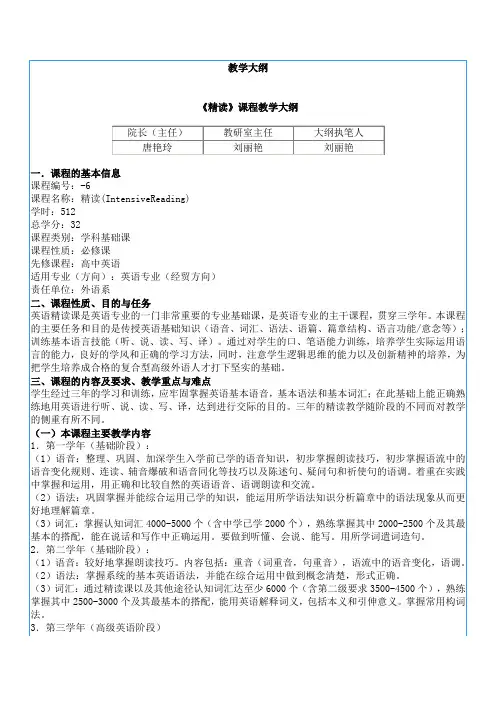
本阶段以培养学生的实际应用能力为目标。
因此,教学中应侧重培养学生自学及独立工作的能力,诸如,查阅资料,参考书,使用工具书,以及写论文等综合能力,并具有较强的口、笔语能力,能使学生在听、说、读、写、译等各方面有一个更高的飞跃。
具体目标如下:(1)VOA及BBC新闻广播的主要内容。
能听懂英语国家人士关于日常生活、社会生活的讲演或交谈以及难度相当于TOEFL中minitalks等中等难度听力材料,理解中心大意并用英语作简要笔记。
(2)就一般日常生活和社会生活同英语国家人士交谈,要求能正确表达思想,语音、语调正确,无重大语法错误,语言基本得体。
(3)通过精读课以及其他途径认知词汇达7000-9000个,熟练掌握其中4000-5000个及其最常用的搭配。
(4)学习英语国家出版的中等水平的材料和文章,提高阅读理解能力,培养一定的文学欣赏能力。
(5)写各种摘要、提纲、记笔记、故事梗概、读书报吿、课程论文及正式的书信。
(二)本课程应达到的基本要求1.理论教学的基本要求牢固掌握英语基本语音,基本语法和基本词汇;能正确熟练地用英语进行听、说、读、写、译;通过掌握语言知识和语言技能,要求达到运用英语进行交际的目的;具有逻辑思维的能力。
2.学生应该具备的能力:(1)第一学年的基本要求:①语音:能自觉地模仿和纠音,初步掌握朗读技巧,初步掌握语流中的语音变化规则、连读、辅音爆破和语音同化等技巧以及陈述句、疑问句和祈使句的语调。
②语法:要掌握主谓一致关系,名词性从句等句型、直接引语和间接引语的用法,非谓语动词的用法、各种时态、语态和构词法。
③词汇:掌握认知词汇4000-5000个(含中学已学2000个),熟练掌握其中2000-2500个及其最基本的搭配,能在说话和写作中正确运用。
要做到听懂、会说、能写。
用所学词遣词造句。
④语言能力:基本的复述、自述能力;基本的会话能力;能够理解语篇,并能就某一问题发表个人的看法;能独立完成课程中的各种翻译练习,要求理解准确、语言通顺。
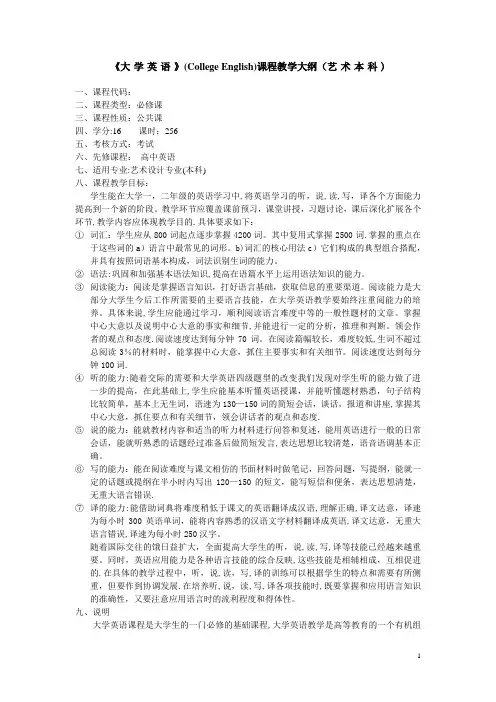
《大学英语》(College English)课程教学大纲(艺术本科)一、课程代码:二、课程类型:必修课三、课程性质:公共课四、学分:16课时:256五、考核方式:考试六、先修课程:高中英语七、适用专业:艺术设计专业(本科)八、课程教学目标:学生能在大学一,二年级的英语学习中,将英语学习的听,说,读,写,译各个方面能力提高到一个新的阶段。
教学环节应覆盖课前预习,课堂讲授,习题讨论,课后深化扩展各个环节,教学内容应体现教学目的.具体要求如下:①词汇:学生应从800词起点逐步掌握4200词。
其中复用式掌握2500词.掌握的重点在于这些词的a)语言中最常见的词形。
b)词汇的核心用法c)它们构成的典型组合搭配,并具有按照词语基本构成,词法识别生词的能力。
②语法:巩固和加强基本语法知识,提高在语篇水平上运用语法知识的能力。
③阅读能力:阅读是掌握语言知识,打好语言基础,获取信息的重要渠道。
阅读能力是大部分大学生今后工作所需要的主要语言技能,在大学英语教学要始终注重阅能力的培养。
具体来说,学生应能通过学习,顺利阅读语言难度中等的一般性题材的文章。
掌握中心大意以及说明中心大意的事实和细节,并能进行一定的分析,推理和判断。
领会作者的观点和态度.阅读速度达到每分钟70词。
在阅读篇幅较长,难度较低,生词不超过总阅读3%的材料时,能掌握中心大意,抓住主要事实和有关细节。
阅读速度达到每分钟100词.④听的能力:随着交际的需要和大学英语四级题型的改变我们发现对学生听的能力做了进一步的提高,在此基础上,学生应能基本听懂英语授课,并能听懂题材熟悉,句子结构比较简单,基本上无生词,语速为130—150词的简短会话,谈话,报道和讲座,掌握其中心大意,抓住要点和有关细节,领会讲话者的观点和态度.⑤说的能力:能就教材内容和适当的听力材料进行问答和复述,能用英语进行一般的日常会话,能就听熟悉的话题经过准备后做简短发言,表达思想比较清楚,语音语调基本正确。
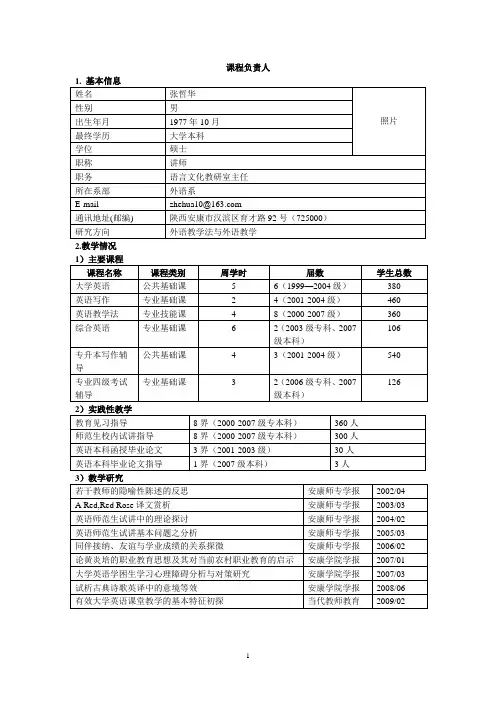
课程负责人2.教学情况5)获奖情况2004年、2005年分别评为系级、校级优秀教师。
主讲教师情况1. 基本信息2.教学情况1)主要课程2)实践性教学3)教学研究4)主持和参与的教研课题5)获奖情况教学队伍情况2教学队伍整体结构情况综合英语课程是英语专业本科的主干基础课。
目前从事本课程建设和教学的教师共7人。
其中副教授2人,讲师4人,助教1人。
具有硕士学位或正在攻读硕士学位的教师5人,拥有硕士学位以上学历的教师占57%。
主讲教师的年龄35岁以下4人,35岁以上,45岁以下2人。
本课程教师队伍结构基本合理,中青年结合,随着英语本科专业的持续发展,现任的大部分青年教师在老教师的指导下,必将在教学经验、教学水平、教学艺术上取得较大进步,成长为本课程的骨干教师。
高学历人才的引进,也必将为本课程师资力量的壮大增添新的血液。
在教培养方面,将采取以下措施:1. 搞好本课程青年教师的传、帮、带工作,要求青年教师分批考研,进行业务自修;2. 鼓励中年教师和已取得硕士学位的教师承担重要科研课题,参加重要学术会议;3.正确处理教学与科研的关系,鼓励青年教师撰写教研科研论文,提高学术研究水平。
3. 教学改革与教学研究《综合英语》课程是英语本科专业的主干基础课程,在我系开设时间较短。
为了提高教学质量,改革传统的英语精读教学方法和模式,为把该课程建设为系级乃至校级重点课程,我们已做了大量工作。
首先,认真学习《高校英语专业教学大纲》,制定了《综合英语》课程教学大纲,先后学习了任务型语言教学法、交际教学法、建构主义理论等,转变教学观念和思想,探讨教学方法,交流教学经验,解决教学中存在的问题和教学难点。
其次,为确保课程教学质量,确立了集体备课、下班辅导、单元测试等制度,通过严格完善教学管理促进教学水平的提高。
第三,规范教案格式,并每学期进行教案展示。
第四,定期开展主题鲜明的教研活动,要求每位教师撰写教学心得或教改总结。
第五,每学期举行公开课、观摩课活动,为教师提供展示才华、交流经验的平台。
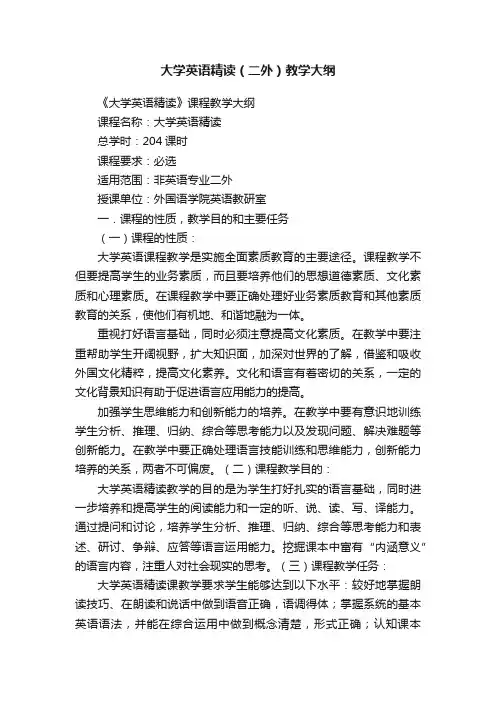
大学英语精读(二外)教学大纲《大学英语精读》课程教学大纲课程名称:大学英语精读总学时:204课时课程要求:必选适用范围:非英语专业二外授课单位:外国语学院英语教研室一.课程的性质,教学目的和主要任务(一)课程的性质:大学英语课程教学是实施全面素质教育的主要途径。
课程教学不但要提高学生的业务素质,而且要培养他们的思想道德素质、文化素质和心理素质。
在课程教学中要正确处理好业务素质教育和其他素质教育的关系,使他们有机地、和谐地融为一体。
重视打好语言基础,同时必须注意提高文化素质。
在教学中要注重帮助学生开阔视野,扩大知识面,加深对世界的了解,借鉴和吸收外国文化精粹,提高文化素养。
文化和语言有着密切的关系,一定的文化背景知识有助于促进语言应用能力的提高。
加强学生思维能力和创新能力的培养。
在教学中要有意识地训练学生分析、推理、归纳、综合等思考能力以及发现问题、解决难题等创新能力。
在教学中要正确处理语言技能训练和思维能力,创新能力培养的关系,两者不可偏废。
(二)课程教学目的:大学英语精读教学的目的是为学生打好扎实的语言基础,同时进一步培养和提高学生的阅读能力和一定的听、说、读、写、译能力。
通过提问和讨论,培养学生分析、推理、归纳、综合等思考能力和表述、研讨、争辩、应答等语言运用能力。
挖掘课本中富有“内涵意义”的语言内容,注重人对社会现实的思考。
(三)课程教学任务:大学英语精读课教学要求学生能够达到以下水平:较好地掌握朗读技巧、在朗读和说话中做到语音正确,语调得体;掌握系统的基本英语语法,并能在综合运用中做到概念清楚,形式正确;认知课本(包括课文和练习)中出现的词汇及其基本搭配,熟悉现代英语中的主要构词法,熟练掌握一些常用的前缀、后缀,借以扩大词汇量,熟练掌握其中四级要求词汇及搭配,并能在说话和写作中灵活应用;培养学生的阅读技能,能就所读材料进行回答、复述、概述和讨论;培养学生连句成段的能力,并按练习要求练习段落写作,做到语言得体、语法准确;能借助词典将英语短文译成汉语,理解正确,译文达意;能借助词典将内容熟悉的汉语句子译成英语,译文达意,无重大语言错误。
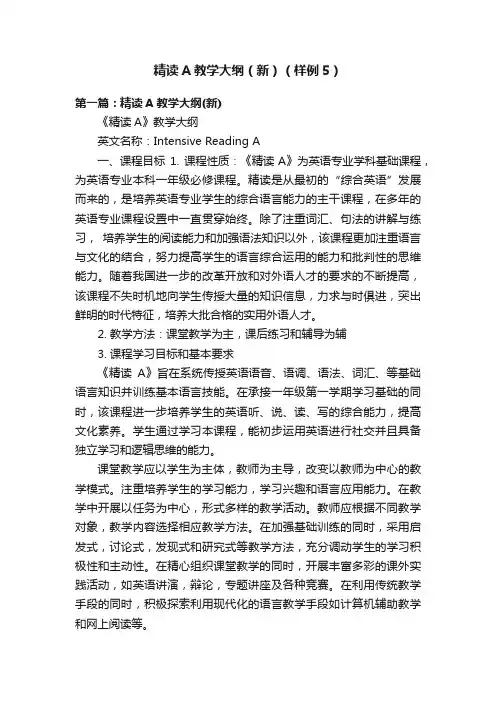
精读A教学大纲(新)(样例5)第一篇:精读A教学大纲(新)《精读A》教学大纲英文名称:Intensive Reading A一、课程目标1. 课程性质:《精读A》为英语专业学科基础课程,为英语专业本科一年级必修课程。
精读是从最初的“综合英语”发展而来的,是培养英语专业学生的综合语言能力的主干课程,在多年的英语专业课程设置中一直贯穿始终。
除了注重词汇、句法的讲解与练习,培养学生的阅读能力和加强语法知识以外,该课程更加注重语言与文化的结合,努力提高学生的语言综合运用的能力和批判性的思维能力。
随着我国进一步的改革开放和对外语人才的要求的不断提高,该课程不失时机地向学生传授大量的知识信息,力求与时俱进,突出鲜明的时代特征,培养大批合格的实用外语人才。
2. 教学方法:课堂教学为主,课后练习和辅导为辅3. 课程学习目标和基本要求《精读A》旨在系统传授英语语音、语调、语法、词汇、等基础语言知识并训练基本语言技能。
在承接一年级第一学期学习基础的同时,该课程进一步培养学生的英语听、说、读、写的综合能力,提高文化素养。
学生通过学习本课程,能初步运用英语进行社交并且具备独立学习和逻辑思维的能力。
课堂教学应以学生为主体,教师为主导,改变以教师为中心的教学模式。
注重培养学生的学习能力,学习兴趣和语言应用能力。
在教学中开展以任务为中心,形式多样的教学活动。
教师应根据不同教学对象,教学内容选择相应教学方法。
在加强基础训练的同时,采用启发式,讨论式,发现式和研究式等教学方法,充分调动学生的学习积极性和主动性。
在精心组织课堂教学的同时,开展丰富多彩的课外实践活动,如英语讲演,辩论,专题讲座及各种竞赛。
在利用传统教学手段的同时,积极探索利用现代化的语言教学手段如计算机辅助教学和网上阅读等。
4. 课程学时:64学时5. 课程学分:4学分6. 课程类型:学科基础课7. 考核方式:考试8. 适用专业与年级:英语专业本科一年级二、课程结构Lesson 1 Half a Day(学时数: 12)知识点:1) Words : clutch; convince; vast; intricate; overlook; variety; revolve; present; trace; daze;2) Phrases: throw sb. into/out of a place; make (a useful man) out of a boy; there is no good to be had in doing sth.; cling to; burst into; a matter of; fool around; bring about; give rise to; resort to; take advantage of; in vain; find one‟s way to; show off ; let up;重点:1) Grammar: the usage of “would”2) Word Formation: pefix: uni-, over-; root: var(i)-;难点: Writing Device: the employment of short sentence;Lesson 2 The Boy and the Bank Officer(学时数: 8)知识点:1) Words: account; authority; damn; fortyish; interfere; mustache; neighborhood; shrug; withdraw;2) Phrases: wear an expression of; turn to; think twice; as to; move; zero in on sb. /sth.; shake sb. down; be on the case; happen to do (be); more than; once bitter, twice shy;重点:1) Grammar: the past continuous tense;2) Word Formation: suffix: -ish; prefix: inter-; 难点: Writing Device: hyperbole;Lesson 3 Message of the Land(学时数: 10)知识点:1) Words: forefather; infancy; afford; bully; insult; pierce; fertile; scarcity; lust; strip; heal; ripen; ripple; shimmer;bleed; replace; litter; fashionable; strike; shame; condemn;2) Phrases: now and then; mind one‟s own...; in spite of; barter...for; spring up, tend to; give sb. a good beating; as for; occur to; a bag of bones; in rags; at peace with; tie... down; bird/etc.... on the wing; pass...onto;重点:1) Grammar: usage of “as”; relative pronoun as the object of a preposition in relative clause;2) Word Formation: prefix: fore-; root: -cur-; suffix: -able/ible;难点:Writing Device: simile, metaphor and personification;Lesson 4 Midnight Visitor(学时数: 8)知识点:1) Words: blackly; blink; bore; chuckle; commanding; confounded; disillusioned; explanatorily; moodily;2) Phrases: black with anger; down the corridor; except for; for one thing; instead of; block off; check out on; switch on; bite one‟s lip; save some trouble; take cheer; unlock the dorr;重点:1) Grammar: …as‟ used in time and reason clause; the passive voice (1)2) Word Formation: prefix: dis-, un-, tele-; 难点:Writing Device: character analysis; Lesson 5 The Green Banana (学时数: 8)知识点:1) Words : encounter; strain; radiator; leak; scatter; spout; assure; ignorance; formation; pinnacle; tease; grasp; armful; once;2) Phrases: consist of; pat sb. on the shoulder; work out; in turn; as if; make sure; call for; on one‟s part; in case; regard…as; reflect on; in relation to; at once; tend to; dawn upon/on;重点:1) Grammar: adverbial clauses of reason and time; grammatical functions of the infinitives;2) Word Formation: prefix: re-; suffix: -ance (-ence); 难点:Writing Device: humor and symbolism; 难点:Writing Device: simile;Lesson 6 Mandela’s Garden(学时数: 8)知识点:1) Words: arrange; constant; construct; cultivate; decline; dump; eliminate; empty; enduring; eventually; failure; intellectual; issue; legal; manual; nourish; offer; organize; patch; pursue; remove; survive; tend; trial; warder; wither;2) Phrases: at length; at heart; at the time; bring back to life/health; cut out; 重点:1) Grammar: adverbial clause of manner;2) Word Formation: suffix: -al; 难点:Writing Device: parallelism;Lesson 7 Maheegun My Brother (学时数: 10)知识点:1) Words : alert; chase; crouch; detain; drift; howl; leap; mantle; mischievous; muzzle; poke; rifle; rumble; slash; smother; snarl; soaked; sob; squirrel; stillness; stir; thicken; toll; wiggle; wrap;2) Phrases: as business as a squirrel; at such times; blow oneself out; fan it to life; for life; in its place; late in coming; quiet down; sit up; slash off; tear off; wild with anger;重点:1) Grammar: the use of time conjunction: after, before, and when; inversion; infinitive of result;2) Word Formation: prefix:un-; suffix: -en;难点: Writing Device: smile; personification;三、课程资料教材:杨立民,《现代大学英语精读1》 (第二版),外语教学与研究出版社,2010。
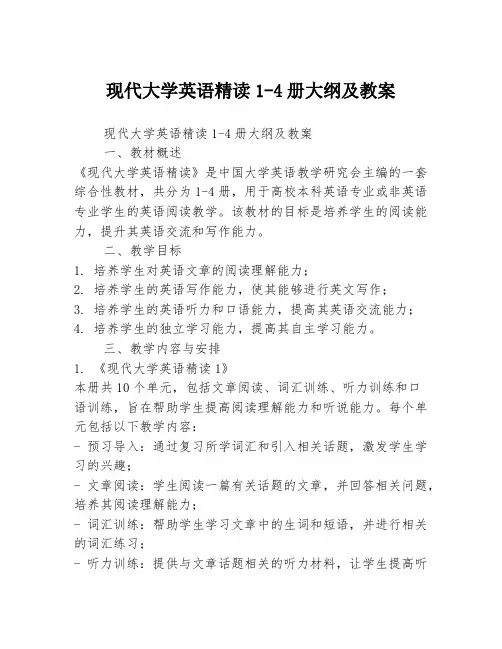
现代大学英语精读1-4册大纲及教案现代大学英语精读1-4册大纲及教案一、教材概述《现代大学英语精读》是中国大学英语教学研究会主编的一套综合性教材,共分为1-4册,用于高校本科英语专业或非英语专业学生的英语阅读教学。
该教材的目标是培养学生的阅读能力,提升其英语交流和写作能力。
二、教学目标1. 培养学生对英语文章的阅读理解能力;2. 培养学生的英语写作能力,使其能够进行英文写作;3. 培养学生的英语听力和口语能力,提高其英语交流能力;4. 培养学生的独立学习能力,提高其自主学习能力。
三、教学内容与安排1. 《现代大学英语精读1》本册共10个单元,包括文章阅读、词汇训练、听力训练和口语训练,旨在帮助学生提高阅读理解能力和听说能力。
每个单元包括以下教学内容:- 预习导入:通过复习所学词汇和引入相关话题,激发学生学习的兴趣;- 文章阅读:学生阅读一篇有关话题的文章,并回答相关问题,培养其阅读理解能力;- 词汇训练:帮助学生学习文章中的生词和短语,并进行相关的词汇练习;- 听力训练:提供与文章话题相关的听力材料,让学生提高听力理解能力;- 口语训练:通过对话和口语练习,训练学生的口语表达能力。
2. 《现代大学英语精读2》本册共12个单元,内容包括了不同主题的文章阅读、词汇练习、听力练习和口语训练。
教学内容安排如下:- 预习导入:导入本单元的主题,激发学生兴趣;- 文章阅读:学生阅读一篇较长的英语文章,并回答相关问题,提高理解能力;- 词汇训练:学习并掌握文章中的生词和短语,进行词汇练习;- 听力训练:提供与文章话题相关的听力材料,训练学生的听力理解能力;- 口语训练:通过对话和口语练习,提高学生的口语表达能力。
3. 《现代大学英语精读3》本册共10个单元,每个单元都包括了与不同主题相关的文章阅读、词汇练习、听力练习和口语训练。
教学内容安排如下:- 预习导入:引入本单元的话题,激发学生学习的兴趣;- 文章阅读:学生阅读一篇相关主题的英语文章,提高其阅读理解能力;- 词汇训练:学习文章中的生词和短语,进行词汇练习;- 听力训练:提供与文章话题相关的听力材料,训练学生的听力理解能力;- 口语训练:通过对话和口语练习,训练学生的口语表达能力。
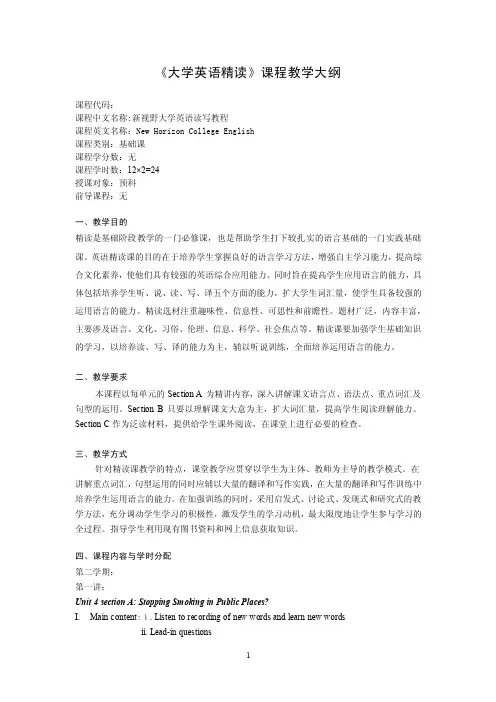
《大学英语精读》课程教学大纲课程代码:课程中文名称:新视野大学英语读写教程课程英文名称:New Horizon College English课程类别:基础课课程学分数:无课程学时数:12×2=24授课对象:预科前导课程:无一、教学目的精读是基础阶段教学的一门必修课,也是帮助学生打下较扎实的语言基础的一门实践基础课。
英语精读课的目的在于培养学生掌握良好的语言学习方法,增强自主学习能力,提高综合文化素养,使他们具有较强的英语综合应用能力。
同时旨在提高学生应用语言的能力,具体包括培养学生听、说、读、写、译五个方面的能力,扩大学生词汇量,使学生具备较强的运用语言的能力。
精读选材注重趣味性、信息性、可思性和前瞻性。
题材广泛,内容丰富,主要涉及语言、文化、习俗、伦理、信息、科学、社会焦点等。
精读课要加强学生基础知识的学习,以培养读、写、译的能力为主,辅以听说训练,全面培养运用语言的能力。
二、教学要求本课程以每单元的Section A为精讲内容,深入讲解课文语言点、语法点、重点词汇及句型的运用。
Section B只要以理解课文大意为主,扩大词汇量,提高学生阅读理解能力。
Section C作为泛读材料,提供给学生课外阅读,在课堂上进行必要的检查。
三、教学方式针对精读课教学的特点,课堂教学应贯穿以学生为主体、教师为主导的教学模式。
在讲解重点词汇,句型运用的同时应辅以大量的翻译和写作实践,在大量的翻译和写作训练中培养学生运用语言的能力。
在加强训练的同时,采用启发式、讨论式、发现式和研究式的教学方法,充分调动学生学习的积极性,激发学生的学习动机,最大限度地让学生参与学习的全过程。
指导学生利用现有图书资料和网上信息获取知识。
四、课程内容与学时分配第二学期:第一讲:Unit 4 section A: Stopping Smoking in Public Places?I.Main content:ⅰ. Listen to recording of new words and learn new wordsii. Lead-in questionsII. Comprehension of the text第二讲:Unit 4 section A: Stopping Smoking in Public Places?Main content: I. Language points of the textprehension exercise of the textIII. Discussion on the topic of “How Does Smoking Hurt People’s Health?”第三讲:Unit 4 section A: Stopping Smoking in Public Places?I. Main content:Exercises of translation and vocabularyII. Grammar: sentences of implied conditionIII.Pronunciation reviewIV.Practicing of pronunciation第四讲:Unit 4 section B: A Decision Made Too LateMain content: ⅰ. Review the words in section Aii. Learn the new words and language points in section Bprehension of the textIII. ExercisesIV. Instruction of section C第五讲:Unit 5 Section A: Too Many Choices in ShoppingI.Main content: ⅰ. Check the answers of unit 4 section Cii. Listen to recording of new words and learn new wordsⅲ. Lead-in questionsprehension of the textIII. Discussion on the topic of “The Advantages and Disadvantages in Advertising”第六讲:Unit 5 Section A: Too Many Choices in ShoppingI. Main content: ⅰ. Review the new words in section Anguage points of the textII. Comprehension exercise of the textIII. Practice of some important expressing and language points第七讲:Unit 5 Section A: Too Many Choices in ShoppingI. Main content:I. Grammar: bare infinitivesii. Review the learned vowels.II.Practice of pronunciationIII.Exercise of translation and vocabulary第八讲:Unit 5 Section B: Advertising EverywhereI. Main content: ⅰ. Review the words in section Aii. Learn the new words and language points in section B prehension of the textIII. . ExercisesIV. Instruction of section C第九讲:Middle Examination第十讲:Unit 6 Section A: The More You Give, the Happier You BecomeⅠMain content: ⅰ. Check the answers of unit 5 section Cii Listen to recording of new words and learn new wordsⅲ. Lead-in questionsnguage points of the textIII.Discuss the story of Lei Feng第十一讲:Unit 6 Section A: The More You Give, the Happier You BecomeI. Main content: ⅰ. Review the words in section Aii. Exercises of translation and new words第十二讲:Unit 6 Section A: The More You Give, the Happier You BecomeMain content:Ⅰ.Grammar: comparison of to do patterns and -ing patternsII. Pronunciation of consonants第十三讲:Unit 6 Section B: Keep Alive Your Sense of HumorⅠMain content: ⅰ. Review the words in section Aii. Learn the new words and language points in section B prehension of the textIII. Exercises of vocabularyIII.Instruction of section C第十四讲:Unit 7 Section A: Why Getting Married So YoungⅠMain content:ⅰ. Check the answers of unit 6 section Cii. Listen to recording of new words and learn new wordsⅲ. Lead-in questionsII. Discussion on the topic: Campus Lovenguage points of text.第十五讲:Unit 7 Section A: Why Getting Married So YoungⅠ.Main content:II. Review the words in section AIII. Language points of text.第十六讲:Unit 7 Section A: Why Getting Married So YoungⅠGrammar: the verb tense in wish clause.II. Pronunciation of consonantsIII. Practice of pronunciation第十七讲:Unit 7 Section B: Love or Infatuation?ⅠMain content: ⅰ. Review the words in section Aii. Learn the new words and language points in section B prehension of the textIII. . ExercisesIV. Instruction of section C第十八讲:Review the new words and language points in unit 4 to unit 7五、教材与参考书《新视野大学英语读写教程》(预备级1)外语教学与研究出版社总主编:郑树棠顾嘉祖,陆昇.《语言与文化》[M].上海外语教育出版社,2002.张道真.《实用英语语法》[M].外语教学与研究出版社,2002.六、考核方式1.考核形式:闭卷考试。
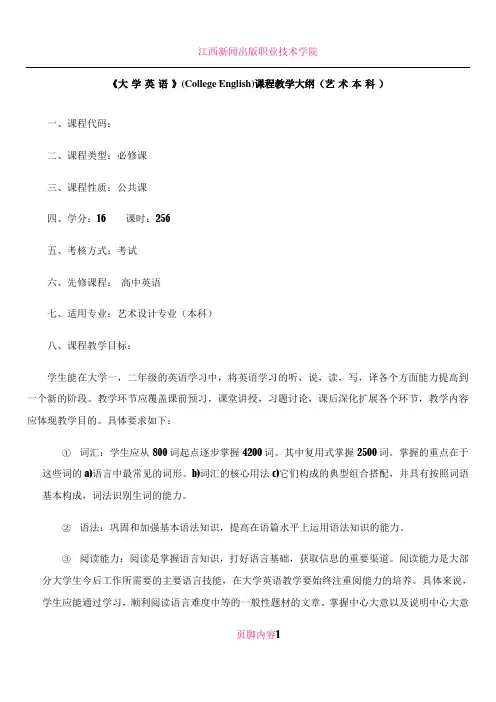
《大学英语》(College English)课程教学大纲(艺术本科)一、课程代码:二、课程类型:必修课三、课程性质:公共课四、学分:16课时:256五、考核方式:考试六、先修课程:高中英语七、适用专业:艺术设计专业(本科)八、课程教学目标:学生能在大学一,二年级的英语学习中,将英语学习的听,说,读,写,译各个方面能力提高到一个新的阶段。
教学环节应覆盖课前预习,课堂讲授,习题讨论,课后深化扩展各个环节,教学内容应体现教学目的。
具体要求如下:①词汇:学生应从800词起点逐步掌握4200词。
其中复用式掌握2500词。
掌握的重点在于这些词的a)语言中最常见的词形。
b)词汇的核心用法c)它们构成的典型组合搭配,并具有按照词语基本构成,词法识别生词的能力。
②语法:巩固和加强基本语法知识,提高在语篇水平上运用语法知识的能力。
③阅读能力:阅读是掌握语言知识,打好语言基础,获取信息的重要渠道。
阅读能力是大部分大学生今后工作所需要的主要语言技能,在大学英语教学要始终注重阅能力的培养。
具体来说,学生应能通过学习,顺利阅读语言难度中等的一般性题材的文章。
掌握中心大意以及说明中心大意页脚内容1的事实和细节,并能进行一定的分析,推理和判断。
领会作者的观点和态度。
阅读速度达到每分钟70词。
在阅读篇幅较长,难度较低,生词不超过总阅读3%的材料时,能掌握中心大意,抓住主要事实和有关细节。
阅读速度达到每分钟100词。
④听的能力:随着交际的需要和大学英语四级题型的改变我们发现对学生听的能力做了进一步的提高,在此基础上,学生应能基本听懂英语授课,并能听懂题材熟悉,句子结构比较简单,基本上无生词,语速为130-150词的简短会话,谈话,报道和讲座,掌握其中心大意,抓住要点和有关细节,领会讲话者的观点和态度。
⑤说的能力:能就教材内容和适当的听力材料进行问答和复述,能用英语进行一般的日常会话,能就听熟悉的话题经过准备后做简短发言,表达思想比较清楚,语音语调基本正确。
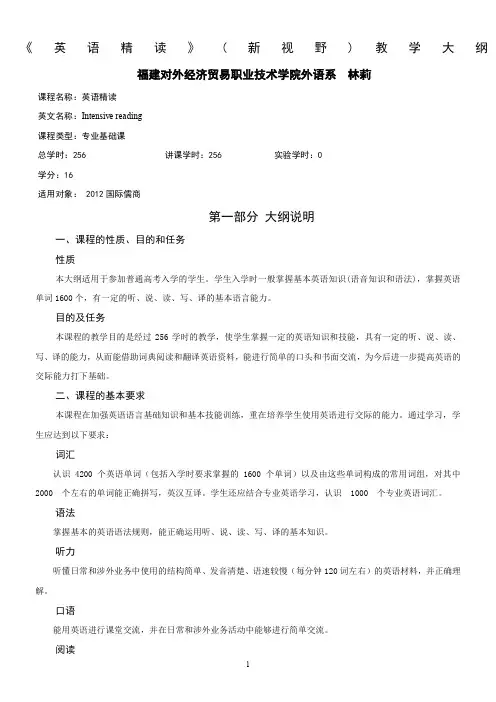
《英语精读》(新视野)教学大纲福建对外经济贸易职业技术学院外语系林莉课程名称:英语精读英文名称:Intensive reading课程类型:专业基础课总学时:256 讲课学时:256 实验学时:0学分:16适用对象: 2012国际儒商第一部分大纲说明一、课程的性质、目的和任务性质本大纲适用于参加普通高考入学的学生。
学生入学时一般掌握基本英语知识(语音知识和语法),掌握英语单词1600个,有一定的听、说、读、写、译的基本语言能力。
目的及任务本课程的教学目的是经过256学时的教学,使学生掌握一定的英语知识和技能,具有一定的听、说、读、写、译的能力,从而能借助词典阅读和翻译英语资料,能进行简单的口头和书面交流,为今后进一步提高英语的交际能力打下基础。
二、课程的基本要求本课程在加强英语语言基础知识和基本技能训练,重在培养学生使用英语进行交际的能力。
通过学习,学生应达到以下要求:词汇认识4200 个英语单词(包括入学时要求掌握的1600 个单词)以及由这些单词构成的常用词组,对其中2000 个左右的单词能正确拼写,英汉互译。
学生还应结合专业英语学习,认识 1000 个专业英语词汇。
语法掌握基本的英语语法规则,能正确运用听、说、读、写、译的基本知识。
听力听懂日常和涉外业务中使用的结构简单、发音清楚、语速较慢(每分钟120词左右)的英语材料,并正确理解。
口语能用英语进行课堂交流,并在日常和涉外业务活动中能够进行简单交流。
阅读能阅读一般题材英文资料,理解正确。
阅读速度不低于每分钟80词。
能读懂日常的信函、技术说明书、合同等、理解正确。
写作能就一般性题材,半小时内写出约150个单词的作文,能够写作英语应用文,如填写表格与单证,简历、通知、信函等,文句基本正确,无严重的语法错误,格式恰当,表达清楚得体。
翻译能借助词典正确将中等难度的一般题材和一般业务的文字材料英汉互译。
三、本课程与相关课程的联系先修课程:无相关课程:初、高中英语四、学时分配五、教材与参考书《新视野大学英语读写教程》学生用书1-4册郑树堂主编外语教学与研究出版社,2011年《新视野大学英语》综合练习1、2、3、4册同上同上《新视野大学英语》读写教程教师用书1-4册周国强主编外语教学与研究出版社,2011年六、教学方法与手段建议采用启发式,开放式的课堂教学,调动学生的学习兴趣和积极性。
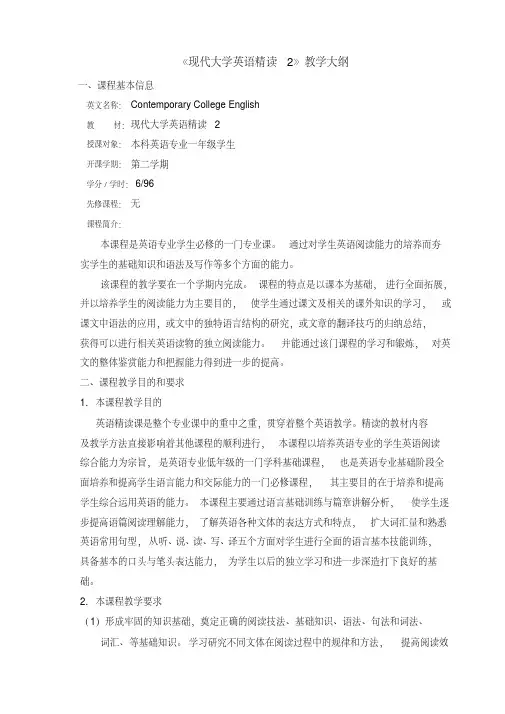
《现代大学英语精读2》教学大纲一、课程基本信息英文名称:Contemporary College English教材:现代大学英语精读2授课对象:本科英语专业一年级学生开课学期:第二学期学分/学时:6/96先修课程:无课程简介:本课程是英语专业学生必修的一门专业课。
通过对学生英语阅读能力的培养而夯实学生的基础知识和语法及写作等多个方面的能力。
该课程的教学要在一个学期内完成。
课程的特点是以课本为基础,进行全面拓展,并以培养学生的阅读能力为主要目的,使学生通过课文及相关的课外知识的学习,或课文中语法的应用,或文中的独特语言结构的研究,或文章的翻译技巧的归纳总结,获得可以进行相关英语读物的独立阅读能力。
并能通过该门课程的学习和锻炼,对英文的整体鉴赏能力和把握能力得到进一步的提高。
二、课程教学目的和要求1.本课程教学目的英语精读课是整个专业课中的重中之重,贯穿着整个英语教学。
精读的教材内容及教学方法直接影响着其他课程的顺利进行,本课程以培养英语专业的学生英语阅读综合能力为宗旨,是英语专业低年级的一门学科基础课程,也是英语专业基础阶段全面培养和提高学生语言能力和交际能力的一门必修课程,其主要目的在于培养和提高学生综合运用英语的能力。
本课程主要通过语言基础训练与篇章讲解分析,使学生逐步提高语篇阅读理解能力,了解英语各种文体的表达方式和特点,扩大词汇量和熟悉英语常用句型,从听、说、读、写、译五个方面对学生进行全面的语言基本技能训练,具备基本的口头与笔头表达能力,为学生以后的独立学习和进一步深造打下良好的基础。
2.本课程教学要求(1)形成牢固的知识基础,奠定正确的阅读技法、基础知识、语法、句法和词法、词汇、等基础知识。
学习研究不同文体在阅读过程中的规律和方法,提高阅读效率和阅读能力。
(2)在课堂活动上注重发挥学生的主动性与积极性,注重培养学生的自主学习能力;在教学过程中注意纵向连贯和横向配合,循序渐进。
(3)充分利用教材中的相关内容,培养学生的独立思考、思维判断等能力,帮助学生了解人际关系、种族歧视、人与自然、生活方式、价值观念等各个方面的相关知识;(4)培养学生使用语言进行思想交流的能力,注重帮助学生结合语言学习文化、提高自身人文修养,提高学生的全方面综合素质。
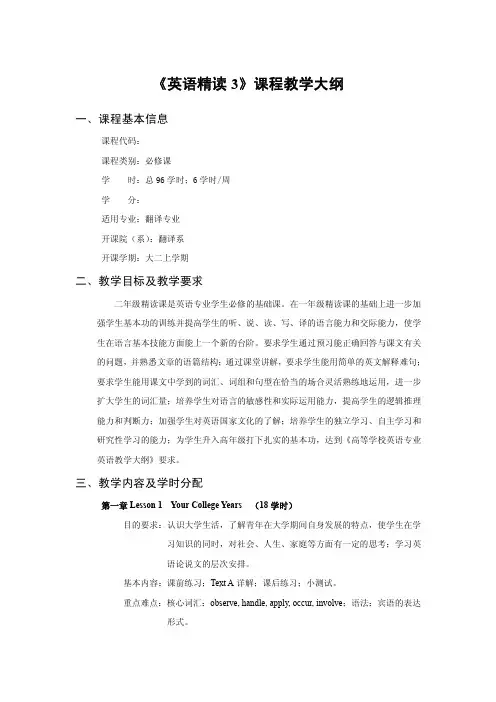
《英语精读3》课程教学大纲一、课程基本信息课程代码:课程类别:必修课学 时:总96学时;6学时/周学 分:适用专业:翻译专业开课院(系):翻译系开课学期:大二上学期二、教学目标及教学要求二年级精读课是英语专业学生必修的基础课。
在一年级精读课的基础上进一步加强学生基本功的训练并提高学生的听、说、读、写、译的语言能力和交际能力,使学生在语言基本技能方面能上一个新的台阶。
要求学生通过预习能正确回答与课文有关的问题,并熟悉文章的语篇结构;通过课堂讲解,要求学生能用简单的英文解释难句;要求学生能用课文中学到的词汇、词组和句型在恰当的场合灵活熟练地运用,进一步扩大学生的词汇量;培养学生对语言的敏感性和实际运用能力,提高学生的逻辑推理能力和判断力;加强学生对英语国家文化的了解;培养学生的独立学习、自主学习和研究性学习的能力;为学生升入高年级打下扎实的基本功,达到《高等学校英语专业英语教学大纲》要求。
三、教学内容及学时分配第一章Lesson 1 Your College Years (18学时)目的要求:认识大学生活,了解青年在大学期间自身发展的特点,使学生在学习知识的同时,对社会、人生、家庭等方面有一定的思考;学习英语论说文的层次安排。
基本内容:课前练习;Text A详解;课后练习;小测试。
重点难点:核心词汇:observe, handle, apply, occur, involve;语法:宾语的表达形式。
第二章Lesson 2 How Reading Changed My Life (18学时)目的要求:理解读书的重要性;赏析课文中提及的主要文学作品;分析读书是怎样改变作者的人生的。
基本内容:课前练习;Text A详解;课后练习;小测试。
重点难点:核心词汇:coax, comprise, prize, supplant, suspect;语法:if only, if not, only if, what if 的用法;there + main verb + subject句型。
英语精读课教学大纲(最新完整版)英语精读课教学大纲《英语精读课教学大纲》是国家教育委员会于1995年发布的一份教学大纲,旨在规范和指导英语精读课程的教学。
该大纲主要包括以下内容:1.课程性质和目的:英语精读课程是一门公共必修课程,旨在培养学生阅读、理解和运用英语的能力,提高学生的英语水平。
2.教学内容和要求:教学内容包括英语语言知识、阅读技巧、文化背景知识等。
教学要求包括掌握基本的英语语法、词汇、阅读技巧等,能够阅读和理解英文原版材料,能够用英语进行简单的口头和书面表达。
3.教材和参考书目:教材应根据教学大纲的要求,选用适合学生水平的教材,或自编教材。
参考书目应包括英语语言知识、文化背景知识等方面的书籍和*。
4.教学方法和手段:教学方法应以讲解、阅读、讨论、练习为主,注重学生的参与和实践。
教学手段应包括多媒体教学、网络教学等现代教学方法。
5.考试和成绩评定:考试应以笔试为主,包括听力、阅读、写作等方面的测试。
成绩评定应包括平时成绩和期末考试成绩,平时成绩应包括学生的出勤率、作业完成情况等。
6.教学时间和安排:教学时间应根据学校和学生的实际情况安排,一般为40-60个学时每周。
该大纲旨在提高英语精读课程的教学质量和效果,为学生提供更好的英语学习环境和资源。
英语散文选读教学大纲英语散文选读教学大纲课程目标:本课程旨在培养学生阅读、理解和分析英语散文的能力,提高其英语阅读和写作水平。
授课内容:主题:自然、人性和文化等领域的散文作品。
授课方法:讲座、讨论、阅读和写作练习相结合。
授课计划:第1周:介绍课程,介绍自然主题的散文。
第2-3周:阅读和理解经典自然主题的英语散文,并进行讨论。
第4-5周:学习人性主题的散文,进行阅读和理解,并进行讨论。
第6-7周:学习文化主题的散文,进行阅读和理解,并进行讨论。
第8周:进行课程总结和考试。
评估方法:期末考试、课堂参与度、作业和写作练习。
参考书目:所选散文作品及相关研究著作。
英语专业一年级精读教学大纲一、课程说明教学原则:一年级阶段,一定要打好扎实的语言基本功,按照听说领先的原则,注重各项语言技能的全面发展,突出语言交际能力的培养。
另外,还要在坚持四项基本原则和爱国主义教育的前提下,培养学生跨文化交际能力,培养学生对文化差异的敏感性、宽容性。
教学目的:综合英语课,即精读课的任务是传授系统的基础语言知识(含语音、语法、语汇、篇章、结构、语言功能、意念等),训练基本语言技能(含听、说、读、写、译),培养学生初步运用英语进行交际的能力,指导学习方法培养逻辑思维的能力,为进入高年级打下扎实的基础。
一年级阶段精读课的重点应放在纠正、巩固语音、语调、强化听说训练、同时增加语汇语法知识并进行简单的写作练习。
要求:一年级结束时,学生在各方面应达到如下要求:语音:能自觉的模仿和纠音,正确掌握多音节单词、复合词和名子的常见重音模式;初步掌握朗读和说话的节奏感,并注意轻重变化对意义表达的影响;初步掌握语言变化规律、连读、辅音爆破和语音同经的技巧以及陈述句、疑问句和祈使句的语调。
语法:在高中英语的基础上,掌握主谓一致关系,表语从句、宾语从句、定语从句和状语从句等句型,直接宾语和间接宾语的用法、动词不定式和分词的用法,各种时态、语态和构词法。
词汇:(从英语的各门课学到)认识语汇4000——5000个,正确使用其中2000个左右及其最基本的搭配。
写作:能在30分钟内写出约120个单词的短文,内容切题,条理清楚,语言正确;能改写课文内容;能正确写出便条和通知等。
翻译:能独立完成课程中的各种翻译练习,要求理解准确,语言能顺。
工具使用:能熟练掌握英文词典和英汉词典的用法,独立解决语言问题.。
二、课程内容第一单元教学目的和要求:了解学生中学阶段语音基础,纠正错误发音。
要求学生准确了解和掌握英语48个音素的发音方法;初步了解英语各种口音的区别;熟悉英语最基本的句子结构及日常用语。
内容要点:英语48个音素、重音、节奏、语调、日常用语教学重点:48个音素、重音、节奏本章难点:浊辅音、破擦音、元音主要教学环节的组织:语音:示范、讲解、个别指导、朗读句型:示范语调、学生朗读、替换练习对话:分角色朗读,背诵时间分配及进度:本单元共分四课,每六课时一课第二单元教学目的和要求:英语基本语法结构及时态;英语基本发音规则及各种句型的语调;英语标点符号的用法内容要点:There be 结构、现在进行时、一般现在时、BE GOING TO结构、表示请求的句型本章难点:There be结构主要教学环节的组织:句型:示范语调、学生背诵并做替换练习,解答疑问课文A:介绍课文相关内容讲解语言点,学生复述或缩写课文,讨论练习:汉译英详细讲解其他练习以检查为主课文B:学生阅读、复述、问答练习时间分配及进度:本单元共分四课,每六课时一课第三单元教学目的和要求:掌握祈使句、情态句、一般过去时和现在完成时的使用,进一步进行重音和语调练习,掌握本章出现的重点语汇的用法内容要点:1)语法:祈使句、情态动词、一般过去时、现在完成时2)语音和语调:祈使句的语调、助动词在句中的重读和情态动词句的语调及字母组合的读法、动词过去式中—ed的读法、辅音群、元音字母的读法本章难点:语法的应用、语章的巩固、辅音群、动词过去式与现在完成式的区别主要教学环节的组织:句型:示范语调、学生背诵并做替换练习,解答疑问课文A:介绍课文相关内容,讲解语言点,学生复述或缩写课文,讨论练习:汉译英详细讲解其他练习以检查为主课文B:学生阅读、复述、问答练习时间分配及进度:本单元共分四课,每六课时一课第四单元教学目的和要求:巩固和掌握动词现在完成进行式,形容词和副词的比较级、将来时,继续练习语音、语调,掌握句子的停顿与连读内容要点:1)语法:现在完成时、比较级、将来时2)语音和语调:不完全爆破、多音节词的重音、字母组合的读音规则,句子的停顿、连读、元音字母组合发音规则总结、辅音字母及其组合读法规则总结、语调的总结。
XX外国语学院《大学英语》精读I教学大纲一、教学性质〈〈大学英语〉〉精读I是由X出版社全国发行的大学英语优秀教材,该课程是职高学生第三学期必修考试课程。
二、学时分配〈〈大学英语〉〉精读I是由设置于第二学年第一学期,总周数为18周,每周3节,总课时为54节。
三、课程基本目的能读懂语言一般难度题材的文章,学会基本的阅读技能。
全面提高学生的听,说,读,写,译的基本技能的培养。
使各种语言技能综合发展,相辅相成,互相促进。
使学生打下扎实的语言基础,掌握良好的语言学习方法,提高文化素质,以适应社会发展和经济建设的需要。
四、教学方法与手段教学方式是以课堂教学为主。
课堂教学不仅要扩大学生的语言知识,加强和提高学生的语言运用能力,还要帮助学生养成良好的学习习惯,培养自学能力,教学中还应正确处理阅读与听、说、读、写、译的关系。
开展丰富多彩的英语课外活动,提高学生学习英语的兴趣和积极性。
要求学生主动参与,积极实践,不断积累,持之以恒。
1、词汇领会式掌握2200个单词(其中复用式掌握的单词为1800个、,以及由这些词构成的常用词组,并具有按照构词法识别生词的能力。
2、阅读能力能顺利阅读语言难度一般题材的文章,掌握中心大意以及说明中心大意的事实和细节,并能就文章的内容进行分析、推理、判断和综合概括领会作者的观点和态度。
阅读速度达到每分钟60词。
3、听的能力对题材熟悉,句子结构不太复杂、生词少、语速为每分钟80—100词的会话、谈话、报道、讲座,能掌握中心大意,抓住要点和细节领会讲话者的观点和态度,并能进行分析、推理和判断。
4、说的能力能就教材内容和一般性的听力材料进行回答,能就一般的社会生活话题进行简单的交谈讨论和发言,表达思想清楚,语音、语调基本正确。
5、写的能力能在阅读难度与课文相仿的书面材料时做笔记、回答问题,能就一定的提纲、表格或图示在半小时内写出80—100字的短文。
内容完整,条理清楚,文理通顺。
6、译的能力能借助词典将难度略低于课文的英语短文译成汉语,理解正确,译文达意。
英语精读教学大纲(最新)英语精读教学大纲英语精读教学大纲应由本人根据自身实际情况书写,以下仅供参考,请您根据自身实际情况撰写。
课程名称:英语精读授课人:张老师课程时长:一学期,32周课程目标:通过本课程的学习,学生应能够:1.掌握英语基础知识,包括语音、语法、词汇等;2.具备基本的阅读、写作、听说能力;3.能够运用所学知识进行简单的英语交流。
授课内容:本课程将包括以下内容:1.语音:学习国际音标,掌握发音规则;2.语法:学习基本语法知识,掌握句子结构;3.词汇:学习常用单词和短语,掌握词汇用法;4.阅读:阅读英文*,提高阅读理解能力;5.写作:练习写作,提高写作能力;6.听说:练习听说,提高口语表达能力。
授课方式:本课程将采用以下方式进行授课:1.课堂教学:讲解知识点、练习题目;2.课外学习:布置作业、学生自学;3.互动教学:组织小组讨论、课堂互动。
课程评估:本课程的评估将包括以下方面:1.出勤率;2.作业;3.测验或考试;4.个人展示或报告。
英语六级阅读理解教学大纲英语六级阅读理解教学大纲主要包括以下几个方面:1.培养阅读速度:学生需要达到每分钟70-80个词的速度,逐步提高到每分钟100-120个词。
2.扩大词汇量:学生需要掌握课本中不熟悉的词汇,并掌握相应的习惯用法。
3.提高阅读理解能力:学生需要提高对阅读理解的准确性和速度,包括主旨大意题、事实细节题、推理判断题等不同类型的题目。
4.培养阅读技能:学生需要掌握精读、泛读、略读、速读等阅读技能,以快速获取信息、解决问题。
5.提高阅读兴趣:通过阅读材料的选择和设计,提高学生阅读的兴趣和积极性。
6.培养学生的英语思维:通过阅读英语材料,培养学生用英语思考的习惯和能力。
7.培养学生的自主学习能力:通过课堂上的阅读活动,培养学生自主学习的能力和习惯。
8.培养学生的跨文化意识:通过阅读英语材料,了解英语国家的文化背景和社会风俗习惯,提高学生的跨文化意识。
2001英语精读教学大纲及复习资料:本学期精读教材为《大学英语》一二册。
每册共有十个单元,每一个单元由课文(Text)、生词(New Words)、注释(Notes)、练习(Study & Practice)、阅读练习(Reading Activity)和有引导的写作(Guided Writing)六部分组成。
重点是培养学习者的阅读能力,同时兼顾写和说的能力的培养。
课文全部是选用原文材料,学习时应着眼全篇内容,同时掌握一些常用词和词组的用法。
练习包括朗读和背诵(Reading loud and Memorizing)、课文理解(Comprehension of Text)、词汇(V ocabulary)、构词(Word Building)、结构(Structure)、完形填空(Cloze)和翻译(Translation)等部分。
朗读和背诵练习主要要求掌握句重音和意群的划分,并熟记课文的有关段落。
课文理解练习要求根据课文回答问题或针对某些内容陈述自己的看法,通过练习提高理解能力和口头表达能力。
词汇和构词练习目的是掌握现代英语中的主要构词法,借以扩大词汇量。
完形填空分A、B两篇。
前者目的是在语篇基础上巩固操练重点词和词组的用法。
后者较难,供学有余力不从心的学员借以进一步提高自己的英语水平。
翻译练习旨在培养熟练使用英语的能力。
阅读练习旨在培养学生的阅读技能,书中每一(或二)单元编列一项技能,并配有一篇内容与课文相近但难度较浅的阅读材料;其中之一1-4级的大纲词汇均加注汉语,要求掌握。
书中所设的复习题或自测题可以帮助巩固所学内容。
《大学英语》第一册较简单,学习时请参照注释进行,并完成课后练习。
第二册难度相对较大,现将每单元重点列举如下。
Unit one:Language focal points:1.manage (to do sth): succeed in accomplishing or handling,esp. with an effortExample: He managed to paint the whole room in one hour.2.signal: (n.) movement, message, device, ect. Used to convey informationExample: All vehicles must stop when the traffic signal turns red.(v.) send a signal or signals toExample: Sailors signal SOS by flags.3.ever since: from then till nowExample: I have known them ever since they came here in 1982.4.known as: generally recognized as; calledExample: The radiation zones around the earth, known as Van Allen Belts, were discovered in 1958.5.be named after: be given the same name (of) asExample: Our elder son was named George after his uncle.6.as to: about; concerningExample: There is no doubt as to her honesty.7.base… on: build or found… on ; use… as a basis forExample: We should always base our opinions on facts.8.for one thing: in the first place (used to introduce a reason, often the reason that firstcomes to the mind; sometimes followed by “for another”)Example: We’d better give up the idea of making a long trip fort the coming holiday. Forone thing, there isn’t time; for another, we don’t have enough money.9.be composed of: be made up ofExample: A car is mainly composed of a body, an engine, and four wheels.10.survive: (1) remain aliveExample: According to the Theory of Evolution , only the fittest animals survive.(2) live longer thanExample: It is unnatural for parents to survive their children.11.indicate: showExample : Early results of the election indicate that the {rime Minister will soon lose his job.12.be unfit(to do sth./for sth.): be not suitable (for sth. /doing sth.)Example: Those who have a low voice are unfit to teach large classes.13.keep doing sth: continue doing sthExample: My parents kept encouraging me to study hard.14.stick up: project upwards ; stand upright ort on endExample : The girl’s hair has stuck up straight with fright.15.give off: send out; emit( a smell, ect)Example: The chimney gives off a lot of waste gas.16.set back: cause to put off or get behind schedule; reverse he progress offExample: Bad weather set back the construction of the building by one month.17.Proceed: continue after having stoppedExample: He glanced at the newcomer and proceeded with typing.Unit two1.shortly: soonExample: He died shortly after the car crash.2.track down: find by determined searching or huntingExample: She spent weeks in the library tracking down reference information in almost all the books on the subject.3.bare: (a.) not covered; with no plants growing on itno more than; mere(v.) reveal4.spring up: arise, develop or grow quickly and as if from nowhereExample: Suspicion sprang up in her mind.5.at (the) sight of: on seeingExample: At sight of the police officer the thief took to his heels.6.feel like: feel a desire for; be inclined for or toExample: What lovely weather! I do feel like a swim.7.motion(v.) give a signal by moving the hand ort head(n..) signal by hand or head; movingExample: He motioned me to sit down while talking into the phone.He made a motion with his hand to make me sit down.8.fighten sb. into doing: cause sb. to do sth. By frightening himExample: They tried every possible means to frighten the old man into signing the paper.9.emerge: come or appear from somewhereExample: The moon emerged from behind clouds.e to: return to consciousnessExample: The driver came to slowly after the accident.11.make for: go toward; start in the direction ofExample: It was getting dark; they turned and made for home.12.light up: give light to; become or make bright with light or colourExample: The sky lights up at sunset.Unit three1.obtain: get through effortExample: the old woman who obtained her degree at the age of 74 won respect from others2.go out of one’s way ( to do sth.): make a special effort or exert oneself more than usual(to do sth.)Example: Jane went out of her way to be nice to the newcomer.3.threaten: hang over dangerously; utter a threat againstgive warning ofExample: Oliver Twist was threatened into stealing.The dark coluds threatened rain.4.refuse, decline, reject: they all mean “to be unwilling to accept, receive or take intoconsideration”. But refuse is stronger than decline, often suggesting firmness and sometimes even bluntness. Decline, on the other hand, is to refuse politely and is often applicable to situations where invitations to social events are turned down. And reject is more emphatic than refuse, implying an unmistakable denial.Examples: I wonder why he refused to discuss the problem at the meeting.I declined her invitation to the dinner party because I had a priorappointment.She rejected his marriage proposal.5.leave…to… leave sb. in charge ofExample: I’ll leave it to you to settle all the business.6.prefer: choose (one thing ) rather than(another)Example: I prefer typing to writing by hand.7.act on: do sth. In accordance with; followExample: Acting on the doctor’s suggestion, the women has decided to go on a diet.8. leave behind: abandon; forget to take or bring along9.of one’s age: of the period or time in which one livesExample: He was the most brilliant composer of his age/10.be superior to: be better thanExample: They were far superior in number to their enemy.11.talent: special natural abilitysb. with special natural abilityExamples: She gave up playing the piano because she did not have much talent for music.Mozart was known as a talent when he was very young12.above all: most important of allExample: Never waste anything, but above all never waste time.13.owe sth. to sb./sth.: be obliged to sb.. for sth.;Example: We owe that important new discovery to Albert Einstein.Unit four1.apply: write to ask for (a job, membership,)(cause to ) have a bearing on; concernmake use ofExamples: Out of th 5000 high school graduates who applied for this famous university, only a handful was omittedThis rule only applies to people above 60.Einstein was not interested n knowing how people applied his theories topractice.2.be short of: have not enough ; be in want ofExample: I am short of cash at the moment.3.chance: possibility; probabilityExample: We have little chance of winning the game.4.depress: make sad; press, push ort pull down; make lowerExamples: I was depressed after reading so much depressing news.If you depress the button there, a robot will come out to serve tea.The OPEC countries depressed their oil output a month ago.5.undo: untie; cancelExamples: In the struggle her hair turned undone.What is done cannot be undone.6.stale: uninteresting because heard before7.attach: give( to) , fasten(to): He attached a cable to his TV setjoin: Several hospitals are attached to this medical school.bind by love or affection: The majority of overseas Chinese are deeply attachedto their mother country.8.in turn: one after anotherExample: They spoke in turn at the meeting.9. consist of: be made up of10.protest: (v.)( n.) He protested to the boss that he was overworked.Steel workers made/ lodge/ enter a protest against wage reduction11.constitute: form, make upExample: Nine planets constitute the solar system.Unit five1.modest: moderate; not large in size or amountExample: They bought a modest house in the northern suburb.2.at ease: relaxed and comfortableThe doctor soon made the worried patient feel at ease.3. correspond with: exchange letters with4.so much so that: to such an extent thatExample: He longed to visit Pares, so much so that he often dreamt about it.5.revert to : go back toExample: My thought reverted to my childhood days.6. exclusively: only; completely7. pursue: go afterExample: It is illegal fort hunters to pursue extremely young animals8.take apart: separate (sth) into partsExample: The professor spent the whole afternoon taking apart his old car.9.approach: (n.) method of doing sth.; way; coming near(v.) come nearExamples: Writers take a more romantic approach to the historic event thanhistorians.All approaches to the park were blocked after the explosion.The pop star is easy of approach.10.work out: solveExample: You seem to have the problem nicely worked out.11.profound: deepExample: The Bermuda Triangle holds one of the world’s most profound mysteries. 12. single out: separate or choose from a group for special treatment or noticeExample: All of us did a very good job but the teacher singled him out for praise.Unit six1.encounter, meet:Encounter is a synonym for meet. It is a more formal word and strongly implies a casual or unexpected meeting.Examples: He promised to meet her at the airport.He encountered an old friend of mine who I had not seen for ages.2.critical: fault-findingExample: She blushed upon hearing those critical remarks.3.have trouble doing sth.: have difficulty doing sth.Example: The boy had a lot of trouble getting up early in winter.4.resolve: (v.) solve; decide (n.) sth. that has been decided; decisionExamples: To the amazement of all , the little boy resolved the equation in five minutes.He resolved that nothing would hold him back.On New Year’s Day, he made a resolve to go fogging twice a week.. ByMarch his resolve was so weakened that he jogged twice a month .5.live with: accept (sth. unpleasant)Example: You must live with the fact that you are no longer as healthy as you were.6.dwell on: think about; speak or write a lot aboutExample: Let bygones be bygones. Don’t dwell so much on the past.7.be bound to: be certain to ; be sure toExample: You are bound to succeed if you keep on trying.8.sound: correct; healthy, in god conditionExample: You can depend on her for a sound judgment.I doubt if he is sound in his mind.9. butterflies in one’s stomach: a feeling of fear or anxiety9.anticipate: see beforehandExample: I anticipate having an enjoyable working relationship with you all.10.in advance: ahead of time; beforehandExample: You have to pay the rent in advance.11.sit on : neglect; do nothing aboutExample: I sent in my application in good time, but the secretary sat on it for a month.12.sole: one and only; unsharedExample: His sole wish is to live an undisturbed life.13.chances are /were (that): it is/was likely (that)Example: Chances are he has already heard the news.14. trying moments: moments that cause severe strain; moments that try one’ s nerve15. bother: (vi.) annoy; trouble (vt.) worry (n.) worry; troubleExamples: I am sorry for bothering you with so many questions.I don’t see any reason for bother with such a petty matter.What a lot of bother about nothing!Unit seven1.pull out: leave; move awayExample: The train pulled out of the station.2.release: set free; allow (news) to be known or published; allow (goods) to be put on sale;loosenExamples: He was released from hospital after a week’s treatment.President Nixon resigned after the Watergate tapes had been released by thepress.In panic he released the handlebar of his bicycle.3. the split second: the very brief moment of time4 specific: detailed and precise; relating to one particular thing, etc.; not generalExamples: The word can only be used in specific situations.What are your specific aims in visiting our university5. contented: satisfied; happy6.clean up the country: put an end to crime and corruption7.What good is…/What’s the god of…?: what is the use of…?Example: What good is money to a person when he is dying?8.turn out: appear; be presentExample: The whole city turned out to welcome the Olympic heroes and heroines.e to : concern; become a matter about( usually used in the phrase “ when it comesto”Example: Joe is not good at sports, but when it comes to arithmetic he is the best in the class.10.trail off: become increasingly weaker and fade away eventuallyExample: Her voice trailed off to a whisper.st: go on; be enough (for)Example: How long will the rain season last?12.relive: live through or undergo againExample: That was an experience I should not like to relive.13.end up: reach a final situation ; finish; come to an endExample: If you continue stealing, you will surely end up in prison.14.illusion: false perception; sth. that does not really existUnit eight1.go out of style: become no longer or cease to be fashionable2.be faced with : be confronted with; meet face to face3.admit to: (formal) confess to; not deny4.be hard on: be stern or strict with; be an unjust or unlucky burden onExample: Faced with such a rival , he has little chance of winning.5.indication: sign or suggestion; pointing to or outExample: We use different tones for the indication of different meanings.6.corresponding : matching ; the sameExamples: The peace talk was held between corresponding officials n the two governments.You win the lottery if you had chosen a number corresponding to the onepublished in the newspaper.7. on the rise : increasing8. a case in point: a fit exampleExample: Nearly all major cities in the US are crime-ridden. A case in point is Chincago.9.charge: (n.) price asked for gods or services; amount of electricity contained in asubstance(v.) accuse; ask as a price; put an amount of electricity intounch: (v.) set a rocket, missile , ect. in motion; start,set going(n.) setting in motionExamples: It is expensive to launch an astronaut into outer space.The world was shocked at the failed launch of spaceship“ Challenger”.11.in the case of : so far as someone or something is concernedExample: We can’t make an exception in the case of Mary.12.lie in: exist in; be found inExample: The cure for ignorance lies in education.13.overnight: for or during the night; suddenlyExample: Those who grow rich overnight are eyed with suspicion.14.tend to : be apt to ; have a tendency toExample: Farmers tend to use more machinery now.15.anyway: in any case; by any possible meansExamples: Anyway you can try.There must be something wrong with my computer. I couldn’t get hooked upto the Internet anyway.16. tempt: attractExample: I feel tempted to eat more than is good for my health.Unit nine1.aptitude: natural ability or skillExample: She has an aptitude for dealing with people.2.against a normal of 100, scored 160: (in an I. Q. test) scored 160 in contrast to anaverage I. Q. of 100against: in contrast to or withExample: She looked pale against the dim light in the room.3.make a fuss over (about): show unnecessary nervous excitement( esp. about unimportantthings)Example: He asked himself why he had made such a big fuss about so simple a matter.4. register: (n) record or list ; (v) write in a list or record5.worthy of: deservingExample: I don’t think this problem is worthy of serious consideration.6.by my estimate: according to my judgment7.take for granted: consider as true or already settled; accept as a matter of courseExample: The father often told his children not to take things for granted.8.determine: made up one’s mindExample: He detrmined to learn how to operate the machine in two day s’ time.9.foist on: impose upon by coercion or trickeryExample: Stores should not foist defective goods on customers.10.pick out: select; chooseExample: It took Mary a ling time to pick out a new dress at the store.11.whereupon: upon that; immediately following thatExample: I described my disastrous morning, whereupon, he laughed and laughed.12. for sure: without doubt; surely or certaintly13. Did you catch many? : Did you trap many people with your trick?14.uneasy: awkward; not easy in mind or bodyExample: He gave an uneasy smile when he met his mother-in- law for the first time. Unit ten1.profit: (n) advantage or good obtained form sth.; money gained in business(v) be of advantage to ; be benefited or helped2.exhaust: (v) tire out ; use up (n.) outlet, in an engine or machine, for steam, vapor. Etc.that has done his workExamples: We al felt exhausted by the stiff hike.The hero’s strength was exhausted after along time in prison.The young man committed suicide by breathing in car exhaust.3.make out: write outExample: The shop assistant made out a receipt for the customer who bought a camera.4.only too: veryExample: If you invite him , he will be only too glad to attend.5.somehow: in one way or anotherExample: Time is pressing, but I’ll finish this work somehow.6.not much of a : not a very goodExample: He is not much of an artist.7.shrug off: dismiss sth. as not deserving one’s attention or as unimportantExample: She can shrug off her troubles and keep smiling.8.pass on: convey to anotherExample: I received y our message, and have passed it on to all those whom it concerns.9. paper boy: a boy who delivers (or sells) newspapers10.routine: (n) fixed and regular way of doing thingsExample: His daily routine begins with checking E-mail messages.11.constructive: helpingExample: The Advisory Group offered some constructive advice.12.favorably: with approvalExample: The president spoke favorably of the plan to clean up the country.13. something above his usual standard: something better than what he usually wrote14.criticize: find fault with ; form and give a judgment ofExample: The Sunday newspaper devotes a page to criticizing new books, films and plays.15.react: respond; respond to sth. with a feeling or take action (against)Examples: The company reacted to criticism and improved its image shortly.People start to react against her pretentiousness.2001英语精读课程作业:Part one Grammar and Vocabulary1.I remember I ____clear to you that experiment would be done next week.A. made thatB. made veryC. made itD. made so2.His parents____, the orphan is now taken care of by the local government.A . have died B. having did C. were dead D. are dying3.____with the size of the whole earth, the highest mountains do not seem high at all.A. When comparedB. To compareC. Comparing themD. Having compared4.Many of us want very much to see the new films, especially____ mentioned by you.A. whichB. thoseC. whoD. what5._____for your help, we’d never have been able to get over the difficulties.A. Had it notB. If it were notC. Had it not beenD. If we had not been6.It makes on ____to me whether he comes to my birthday party or not.A. differenceB. matterC. importanceD. change7.During his first year____, he took some measures to change the traffic conditions in this city.A. in officeB. at the officeC. out of officeD. into the office8.You seem to be afraid that life might pass you by without giving you time to enjoy it____.A. in fullB. to the fullC. at the fullD. full yourself9.____you poor record in school, we think you should study harder.A. In spite ofB. In change ofC. In case ofD. In view of10.Though ____in a big city, he had always preferred to live in a small town.A. raisedB. grownC. cultivatedD. developed11.According to the weather forecast, which is usually ____, it will snow this afternoon.A. emotionB. delightC. opinionD. impact12.He played each note so hot and fast and with such feeling that it had tremendous____ on theaudience.A. increasedB. delightC. opinionD. impact13.Scholarship students ____ nearly a third of the whole enrollment in our college.A. increased byB. accounted forC. added upD. amounted to14.The fact ____ a child asks a question indicates the dawn of understanding, ____without this,no question would arise in his mind.A. that …forB. which…becauseC. that…ifD. which…though15.People who cannot____ between colors are said to be color-blind.A. polishB. distinguishC. accomplishD. negotiate16.Finally, the headmaster consented to ____ proposal into consideration.A. makeB. setC. getD. take17.What adults need to realize is that child goes through a____ of stages in his understanding ofthe world.A. sequenceB. consequenceC. frequencyD. have conveyed18.Children ask questions to supplement or confirm in formation they ____through personalexperience.A. have acquiredB. have givenC. have rejectedD. have conveyed19. We are____ of the latest developments in science and technology by watching TV.A. defined V. expected C. possessed D. informed.20.Kara’s mother occasionally speaks at schools and other organizations, ____to increasepeople’s understanding of AIDS.A. trysB. tryingC. and trysD. try21.I was seven months pregnant with my third child, and Megan____ with me to name the newbaby after Kara.A. preachedB. pressedC. pleadedD. delt22. The secretary carefully folded the letter and ___it into the drawer.A. slidB. scoldedC. skippedD. slipped23.His agreement to buy our house was conditional ____us leaving all the furniture in it.A. toB. inC. onD. for24.The picture ____me of the village where we spent our holidays last summer.A. remembersB. remindsC. recallsD. convinces25.Those who first arrived in the U.S.A. had a good start but hadn’t ____ turned out to be themost successful.A. probablyB. likelyC. necessarilyD. possibly26.My great-grandmother didn’t_____ too much from life and was satisfied with what she had.A. preserveB. wantC. protectD. expect27. He is not the sort of man _____whom I would readily confide.A. inB. withC. aboutD. for28.When we feel guilty and down in the ____, friends will come and reassure us.A. sensesB. knotsC. stampsD. dumps29.Mr. Black was not satisfied with his elder son, so he ____ him of his property right ofinheritance.A. interferedB. imitatedC. insuredD. deprived30.The school-age girl can____ any problems she has come across by herself.A. figure outB. single outC. bring out C. act out31.This is the same story ___ I heard ten years ago.A. thatB. whichC. about thatD. of which32.I advised her that in the presence of the princess she should not say any thing until____ .A. being askedB. askedC. to be askedD. having been asked33.It is necessary that an efficient worker ____ his work on time.A. completesB. completedC. can completeD. complete34.It is during his stay in London ____he began to learn English.A. whenB. whichC. thatD. what35.He was attending a meeting, ____come to your birthday party then.A. unless he would haveB. or he wouldC. nevertheless he did notD. or he would have36.The curious children watched the towers _____.A. erectedB. be erectedC. to be erectedD. being erected37.She never laughed, ____ever lose her temper.A. so did sheB. but she did notC. and nor she didD. nor did she38.I regret_____ him a thief, but I regret even more his stealing my watch!A. to callB. to have calledC. having calledD. called39.You are supposed to ____ in your composition yesterday.A. handB. be handingC. have handedD. handing40.A new technique _____worked out, we set about our project.A. beingB. to beC. havingD. having been41.Some people hope, the rains will return and ease the hardship____ the peasants of NorthChina.A. facedB. facesC. facingD. to face42.Ever since the Smiths moved to the suburbs a year ago, they ____better health.A. could have enjoyedB. had enjoyedC. have been enjoyingD. are enjoying43.He loves doing some reading at home____ t the cinema.A. than to goB. more than goingC. than goingD. rather than to go44.____ of neglecting our education, my parents sent my sister and me to an evening school.A. AccusedB. AccusingC. That they were accusedD. To be accused45.She never regretted paying $200 for the bookcase. As a matter of fact she would gladly havepaid ____for it.A. as much twiceB. as twice muchC. much as twiceD. twice as much46.I was held up by the traffic jam, otherwise I ____here 50 minutes sooner.A. would beB. ought to have beenC. would have beenD. must have been47.That is the distinguished guest ____ the state dinner was given.A. whomB. for whichC. thatD. in whose honor48.The driver carefully checked his car ____ it should go wrong.A. in order thatB. so thatC. lestD. or else49.“ _____his second heart attack if he hadn’t smoked?”A. Would he have hadB. Would he haveC. Had he hadD. Were he to have50.Only after a bay seal is pushed into the sea by its mother ____to swim.A. how will it learnB. will it learn howC. it will learn howD. and it learns how Part two ClozePassage one(1) has there been such a wide choice of attractive foods for tile house-wife to buy. Producers and manufacturers use all expertise to (2) us first-class food in first-class condition at competitive prices, and with most of the hard work already (3) . Convenience foods are here to stay, since more and more women are running jobs and homes, and so (4) neither time (5)energy for unnecessary chores.No sacrifice of quality (6) involved; indeed, pre-packed foods are often fresher and of more even standard ( 7) similar goods (8 ) .Every district has its quota of shops, large and small, stores; supermarkets and shopping centers within easy reach. Every country villages are catered for in ways( 9 ) would have been (10) a generation ago . Try all the facilities in your area,(11) you will find clean, bright , airy premises, well-(12) good and friendly assistants (13) to advise and help you in your choice. It is your custom they want! (14) you have time, “shop around”for special offers and bargain buys. Everyone makes a bad buy occasionally, (15) never make the same mistakes twice. When youhave reason to be (16) , register a complaint and return unsatisfactory goods.1. A. So B. Thus C. Never D. As2. A. present B. provide C. induce D. give3. A. doing B. done C. do D. done4. A. have B. having C. with D. that5. A. and B. no C. or D. nor6. A. being B. is C. been D. were7. A. than B. as C. that D. like8. A . processed B. unprocessed C. processing D. unprocessing9. A. what B. as C. such D. that10. A. possible B. impossible C. avaible D. unavailable11. A. or B. then C. and D. thus12. A. arranged B. qualified C. attracted D. distributed13. A. prepare B. preparing C. readily D. ready14. A. since B. If C. While D. Although15. A. but B. though C. however D. whereas16. A. dissatisfy B. satisfied C. dissatisfied D. unsatisfactoryPassage twoVideo games have become a pervasive form of (1 )in the 1990s. Today an estimated 69 percent of American families own or (2 )video and computer games . Most are (3) entertainment, but in far too many of the most (4) ones , kids are acting out realistic violent (5) on their TV and computer screens.These are not just (6) anymore. These are learning machines. We are (7) kids in the most incredible manner what it’s like to pull the trigger. The focus is on the thrill, enjoyment and reward. What they’re not (8 )are the real-life consequences.Interactive, video games introduce kids to a (9) world that features amazingly lifelike characters, detailed images of brutality, and an audio mix of heart- pounding music. Unlike movies and television, where you (10)the violence acts. When you are into the game, you are (11) the game.1. A.. education B. creation C. entertainment D. experience2. A. buy B. rent C. sell D. hire3. A. harmless B. helpless C. hopeless D. useless4. A. educational B. interesting C. regular D. popular5. A. parts B. experiences C. ideas D. roles6. A. computers B. videos C. games D. experience7. A. teaching B. watching C. educating D. learning8. A. thinking B. learning C. playing D. seeing9. A. creative B. music C. fantasy D. real10. A. imitate B. dislike C. avoid D. watch11. A. in B. for C. above D. offPassage threeOne of the biggest problems the Fire Services faces is to (1) emergency exits in many。